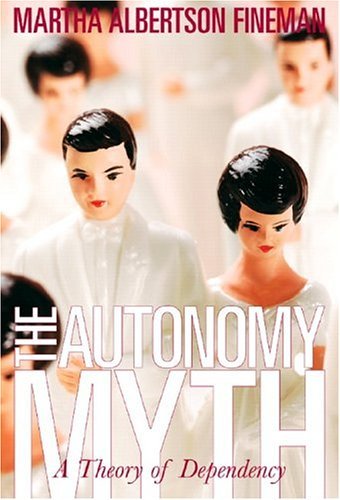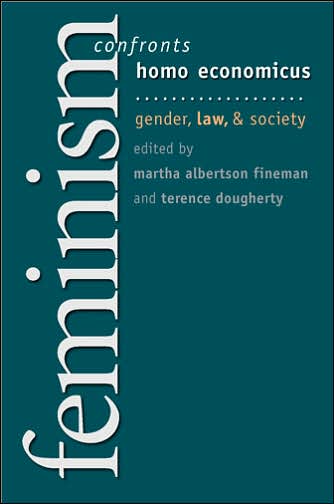Martha Albertson Fineman
“The Autonomy Myth: A Theory of Dependency”
 The director of Cornell University's Feminism and Legal Theory Project, Fineman here imagines legal structures that put caregivers-parents, children of the elderly, spouses, partners or others-at the center of a web of recognitions and subsidies, a framework that works to "reconceptualize and transform our notions about the family and its relationship to the state and other social institutions." Fineman (The Neutered Mother, the Sexual Family and Other Twentieth Century Tragedies) seeks to change how society defines and supports families, traditional or otherwise. Fineman finds that in the U.S., "collective responsibility...is privatized through the institution of the family," and that U.S. domestic policy is oriented toward "the delivery of social goods only in the case of family default." This set-up has allowed, on the one hand, a kind of deregulation of social goods as delivered by corporations and other sources, and on the other, a relative lack of support for many kinds of caregiving relationships, including same-sex households and partnerships. Fineman argues that the U.S. must extend the shield of privacy, in its legal sense, around such caregiving relationships, and support all of them with a guaranteed set of rights and subsidies. Putting caregiving, rather than sexual affiliation, at the center of policy, would reflect a recognition that "merely being financially generous with our own mothers or... wives will not suffice to satisfy the share of societal debt we generally owe all caretakers." While non-scholars should be able to follow Fineman's use of jargon and legal precedents, her book is largely theoretical, and lacks the case studies, anecdotes and reportage that would make her ideas more immediate to lay readers. Anyone who calls for "the abolition of marriage as a legal category," as Fineman has done previously and does again here, is bound to raise hackles, but Fineman makes an interesting case.
The director of Cornell University's Feminism and Legal Theory Project, Fineman here imagines legal structures that put caregivers-parents, children of the elderly, spouses, partners or others-at the center of a web of recognitions and subsidies, a framework that works to "reconceptualize and transform our notions about the family and its relationship to the state and other social institutions." Fineman (The Neutered Mother, the Sexual Family and Other Twentieth Century Tragedies) seeks to change how society defines and supports families, traditional or otherwise. Fineman finds that in the U.S., "collective responsibility...is privatized through the institution of the family," and that U.S. domestic policy is oriented toward "the delivery of social goods only in the case of family default." This set-up has allowed, on the one hand, a kind of deregulation of social goods as delivered by corporations and other sources, and on the other, a relative lack of support for many kinds of caregiving relationships, including same-sex households and partnerships. Fineman argues that the U.S. must extend the shield of privacy, in its legal sense, around such caregiving relationships, and support all of them with a guaranteed set of rights and subsidies. Putting caregiving, rather than sexual affiliation, at the center of policy, would reflect a recognition that "merely being financially generous with our own mothers or... wives will not suffice to satisfy the share of societal debt we generally owe all caretakers." While non-scholars should be able to follow Fineman's use of jargon and legal precedents, her book is largely theoretical, and lacks the case studies, anecdotes and reportage that would make her ideas more immediate to lay readers. Anyone who calls for "the abolition of marriage as a legal category," as Fineman has done previously and does again here, is bound to raise hackles, but Fineman makes an interesting case.
Copyright © Reed Business Information, a division of Reed Elsevier Inc. All rights reserved
AND THIS ALSO...
 Feminism Confronts Homo Economicus: Gender, Law, and Society
Feminism Confronts Homo Economicus: Gender, Law, and Society
Martha Albertson Fineman
"The essays in this volume confront the inroads that economics has made into the legal academy. . . . Law and Economics uses principles of neoclassical economics to develop laws and social policies that maintain if not bolster current allocations of power."-from the Introduction
The Law and Economics school has had a significant impact on the legal and governmental landscape in the United States. It posits a perfectly rational "economic man"-homo economicus-who is unconstrained by familial and communal ties and who can and should make decisions solely in light of considerations of economic value. Feminism Confronts Homo Economicus offers a major intervention in debates about how law has come under the influence of economic principles. Drawing on the latest thinking in the fields of feminist legal theory, critical legal studies, and feminist economics, the essays critique the notion that legal and policy decisions should be made solely through the lens of economics. While the contributors question the wholesale incorporation of the neoclassical economic model into legal analysis, they do not all discard economic analysis and theory.
Situated at the intersection of feminism, law, and economics, Feminism Confronts Homo Economicus will appeal to scholars and students of these disciplines as well as policy analysts and social theorists interested in family, education, labor, and welfare.

About the Author:
Martha Albertson Fineman is Robert W. Woodruff Professor of Law and Senior Fellow at the Center for the Interdisciplinary Study of Religion at Emory University. Her many books include The Autonomy Myth: A Theory of Dependency and The Neutered Mother, The Sexual Family,and Other Twentieth Century Tragedies. Terence Dougherty is an Associate with Patterson, Belknap, Webb & Tyler, LLP, concentrating in tax and exempt organizations work.
Contact E-mail: mfineman@law.emory.edu
|
A click on the author’s name will bring up a description/review in some cases a picture of the cover of the book. |
||||
|
|
||||
|